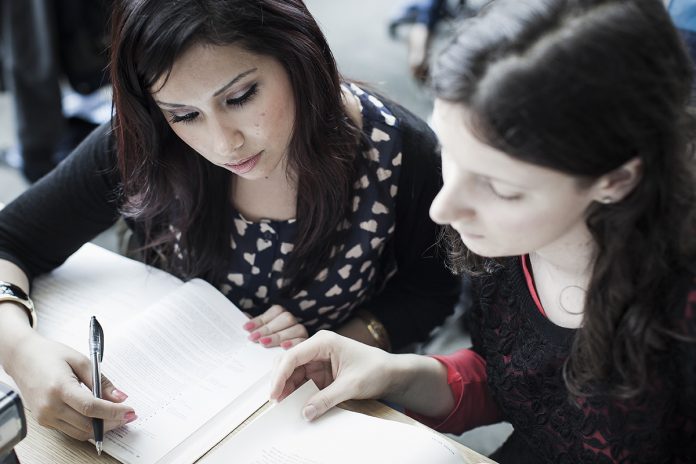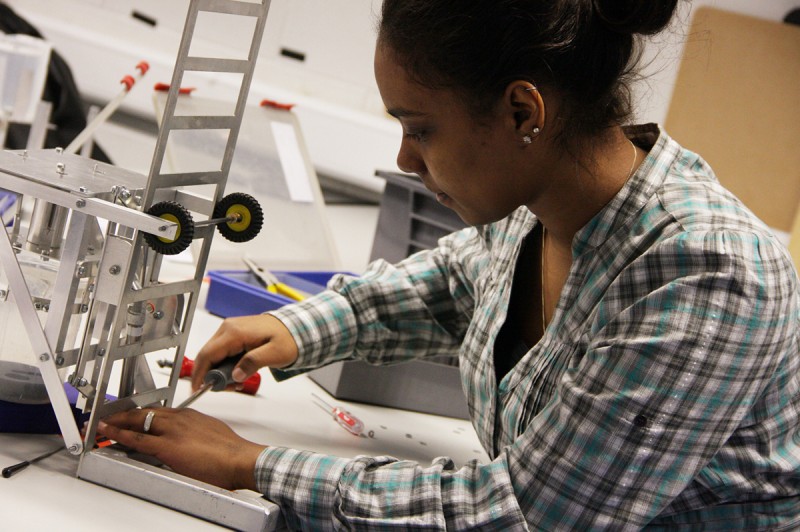Dublin City University established 10 new emerging research centres in 2016, all valuable vehicles for research and enterprise engagement
Dublin City University (DCU) is a young and dynamic university which aims to have an impact on Irish society, not only by placing education, research and innovation at the heart of its strategy, but also by ensuring that the knowledge generated by our students and staff is translated into tangible benefits.
The University has a strong track record in a number of areas represented by established research centres. These centres are a vehicle for enterprise engagement, and numerous schemes involving co-funding between National Funding Agencies and enterprise have enabling fruitful collaboration and the translation of results. These centres perform research and innovation in the following areas: Information and communication technologies, biotechnology and healthcare technologies, novel materials and sustainability, innovation in services and processes, security, democracy and education.
During 2016, the University supported the establishment of 10 additional emerging research centres, both in natural sciences and engineering, as well as in humanities, social sciences, business and education. These centres aspire to become international leaders in areas of key societal importance, and a common denominator of these interdisciplinary hubs is their drive to engage with enterprise.
Water management and sustainable supply
The DCU Water Institute represents the efforts of nearly 30 Principal Investigators who collaborate to translate research into solutions for global water problems. “By 2020, The DCU Water Institute will be Ireland’s Centre of Excellence for the development of technical solutions for water management and sustainable water supply, and for contributions to water policy developments,” Centre Vision, Professor Fiona Regan, Director of DCU Water Institute.
In 2016 Enterprise Ireland collaborated with the DCU Water Institute to set up the first national cluster of companies in the water space, with many collaborative projects already underway. The centre is currently collaborating with an international food manufacturing company, to discover sustainable, environmentally friendly and cost efficient ways of treating waste water in meat processing plants.
Technology solutions for the manufacturing industry
The DCU Advanced Processing Technology Research Centre (APT) focuses on providing solutions to companies in the areas of production technology, micro/nano systems, product design and sustainability, and advanced materials engineering. Members of the centre are a multidisciplinary group who collaborate on both fundamental and applied research, across business, materials processing, chemistry, biotechnology, and physical science, as well as being embedded in national and international collaborations with both industry and academia.
“By 2020 APT will be the national leader in providing processing technology solutions for the manufacturing industry in a variety of sectors. The Centre will continue to grow its international network in order to position APT as the go to entity for processing technology development and collaboration in Europe and internationally,” Centre Vision, Professor Dermot Brabazon, Director of the DCU Advanced Processing Technology Research Centre.
The centre is currently collaborating with national, international and industry partners in the development of metal and polymer materials for additive manufacturing and advanced manufacturing technologies.
Supporting the Internet of Things
The DCU Entwine Centre focuses on the design of platforms to enable the scalable machine-to-machine communications required for the Internet of Things and its applications.
“By 2020, the DCU Entwine Centre will be recognised internationally by academia and industry as a leader in the design of the architectural framework to support the Internet of Things, and will have contributed significantly to standards development in this space,” Centre Vision, Dr Martin Collier, Director of the Entwine Centre.
Researchers at the centre are coordinating an ambitious €6.5m funded project, which aims to redesign the future of technology enhanced learning. The project uses gamification, multisensory and multimodal learning, interactive augmented reality teaching assistants and a virtual experimental fabrication lab to ensure students stay engaged on multiple levels. This technology has the potential to attract students to STEM education and improve access for students with disabilities.
Computational modelling and simulation
The Advanced Research Computing Centre for Complex Systems Modeling (ArcSym) focuses on the investigation of interdisciplinary and complex data-intensive problems that can be modelled computationally.
“By 2020 ARC-SYM (previously SCI-SYM) will become the go-to National Centre of Excellence in ‘research computing’ for a range of generic and specialised services, capabilities, and resources which are necessary for modelling, simulation and predictive analytics. These services will be complementary to those available in the hubs and existing research centres in this emerging, vital and to-date nationally unrecognised area. With this centre, DCU will enhance its reputation nationally and internationally as a research-intensive University of Enterprise,” Centre Vision, Martin Crane, Director of ArcSym.
ArcSym members are working on the development of an Enterprise Architecture model for the city of Limerick that will enable the modelling, measurement, optimisation, control and monitoring of complex interdependent systems of urban life.
Advice and research on family business
DCU Centre for Family Business (CFB) was established in 2013 and is already a centre of excellence in the management and sustainability of Irish family business for future generations. The centre supports family business with leading management advice based on best industry practice and leads national and international research in the area of family business.
“The Centre will be the first research centre of excellence in the management and sustainability of Irish family business. We will support multi-generational Irish family businesses to grow and sustain opportunity for future generations, based on leading national and international research,” Centre Vision, Dr Eric Clinton, Director of the DCU Centre for Family Business (CFB).
Over the past three years the DCU CFB has had a comprehensive engagement programme with over 1,500 family firms. In 2016, the centre won a prestigious research award from the Institute for Family Business (UK) and became a finalist in the US-Ireland Research Innovation Awards for the ground-breaking research on civic wealth creation in Irish and USA family firms.
Image: DCU
The crossroads of society and law
Research at the DCU Socio Legal Research Centre interrogates the impact that law has on society and how society can impact upon the evolution of law. Their research is driven by the symbiotic relationship of society and law, as well as the synergies and creative capacity at moments of collision between them. The variety of research topics are linked by five core themes: Social justice, human rights, ethics, constitutionalism, and governance and regulation.
“By 2020, the DCU Socio-Legal Research Centre will be Ireland’s leading authority in investigating and studying the operation and effects of law on societal, economic and political environments. The DCU Socio-Legal Research Centre will be distinguished by its inter-disciplinary framework and legal research that contribute to transforming the lives of people for the better,” Centre Vision, Dr Tanya Ni Mhuirthile, Director of the DCU Socio-Legal Research Centre.
In September 2016, the centre hosted the biennial Law and Society International Conference on the theme of “State Accountability for Vulnerability”. Current stakeholders engaged with the Centre including the Law Reform Commission of Ireland, the Department of Justice and Equality, and the Department of Communications, as well as the Citizen’s Assembly.
A European centre of ethics
The DCU Institute of Ethics (IOE) was established in September 2008 with the mission to create ethical awareness in relation to all fields of the university’s activities. It also aims to play a leading role in raising public awareness of, and stimulating debate about, ethical issues. In 2016 it was endorsed by the University as a leading research organisation.
“By 2020, the IoE will be recognised nationally and internationally as an important European centre of ethics, distinguished by its research activities and its focus on the translation of ethical theory into societal benefit. This increased recognition will be measurable in terms of increased engagement in funded research and increased output of international publications,” Centre Vision, Bert Gordjin, Director of the DCU Institute of Ethics.
The IoE satisfies an urgent societal need for ethical reflection on the analysis of emerging challenges in science, technology, healthcare, business, media and government. Ethical analysis of these challenges is necessary for the development of solid regulatory frameworks that can guarantee the responsible development of these arenas. More specifically, the IoE currently contributes to ethical analysis of challenges in:
- Cybersecurity;
- Personalisation technologies in ICT;
- Assistive technologies for people with autism, dementia and/or intellectual disabilities;
- Integrity of science and research; and
- End-of-life care.
Within the last couple of years, the Institute has succeeded in attracting research funding in excess of €1.2m, as well as being a partner of choice in H2020 projects by many academic and enterprise collaborators.
Centre of excellence in bullying research
The National Anti-Bullying Research and Resource Centre (ABC) was launched by the Irish Tánaiste and the Minister for Education & Skills in 2014, and endorsed by DCU as a leading research organisation in 2016. Researchers at ABC were the first in Ireland to undertake research on school, workplace, homophobic and cyber bullying. ABC leads the field of research, resource development and training in this area in Ireland and is an internationally recognised centre of excellence in bullying research.
“By 2020, ABC will be the pre-eminent research centre in Europe for anti-bullying research, resource development and training,” Centre Vision, Dr James O’Higgings Norman, Director of ABC.
ABC has contributed to the development of the National Action Plan on Bullying (2013) and researchers at the centre are currently developing resources and training for use in bullying prevention and intervention in schools, workplaces and cyberbullying. In partnership with colleagues at the University of Stavanger in Norway, they have launched an on-line train-the-trainer module in bullying prevention and will start a Master’s programme on bullying at DCU, in September 2017.
Educational quality and equity
The Centre for Evaluation Quality and Inspection (EQI) seeks to enhance quality and equity in educational systems.
“By 2020 EQI will be the leading national and international research agency for teacher professional development in the areas of culturally responsive school evaluation, quality assurance and inspection. This will be achieved through the engagement and dissemination of high quality research, and innovative practice in the linked fields of evaluation and inspection,” Centre Vision, Professor Joe O’Hara, Co-Director of EQI.
In 2016 EQI created a ‘Research Partner Network’ in Ireland, dedicated to enhancing the capacity of schools to generate, use and communicate data relating to educational quality. There are currently 168 schools in the Republic of Ireland and 220 schools in Northern Ireland in this network.
Addressing the challenges facing news media
FuJo was established in 2015 to safeguard and advance the future of news media through research, training, and innovation. With wide-ranging industry partnerships and combined expertise in journalism, data science, engineering, political economy, and ethics, FuJo is uniquely placed among European institutes to take a leading role in responding to the challenges facing news media.
“By 2020, FuJo will be recognised as one of the leading international institutes driving research, innovation, and training in digital media and journalism,” Centre Vision, Dr Jane Suiter, Director of FuJo.
FuJo is the Irish partner for the annual Oxford Reuters Digital News Report and is currently undertaking funded projects on non-linear video and hate speech on social media. FuJo has brought leading industry conferences to DCU – The News Impact Summit and GEN Editors’ Lab – and is a founding member of the Google News Lab University Network.
In supporting these multidisciplinary centres the university aims at creating a future picture of DCU research activity that can address the economic and societal challenges that are of current concern to society and enterprise today.
Dr Ana M Terres
Director of Research Support
Tel: +353 700 7011
Please note: this is a commercial profile












